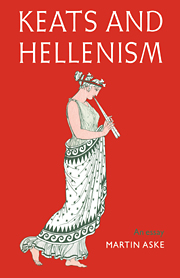Summary
In this chapter I should like to concentrate primarily on the ‘Ode to Psyche’ and the ‘Ode on a Grecian Urn’, with briefer detours through the projected but unfinished ode, ‘Mother of Hermes! and still youthful Maia!’, and the ‘Ode on Indolence’. Composed shortly after the abandonment of Hyperion in the spring of 1819, the ‘Ode to Psyche’ and the ‘Ode on a Grecian Urn’ continue to situate, in a different form, the problem of antiquity's representation, which had shaped both Hyperion and Endymion. Keats now returns to the dominant trope of the early sonnets on Chapman's Homer and the Elgin Marbles, the drama of an encounter between the poet and the forms of antiquity, with its attendant shock and suggestion of epiphany. There is, however, no simple return from narrative to lyric; Keats endeavours ‘to circumvent the sonnet (now so habitual to him) and to develop a longer, more flexible form’. We might go further and propose that, in the longer and more flexible form of the ‘Ode on a Grecian Urn’, in particular, the poet supplements Hyperion by turning to explore the very conditions of narrative. Interrupting Keats's brief epic, the ode might be read as a prologue to what might be possible for a narrative representation of antiquity. It traces the difficult emergence of rhetoric itself, in relation to the fictions and images which it desires to reinscribe in a modern text.
- Type
- Chapter
- Information
- Keats and HellenismAn Essay, pp. 101 - 127Publisher: Cambridge University PressPrint publication year: 1985

